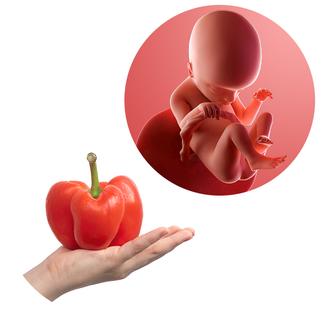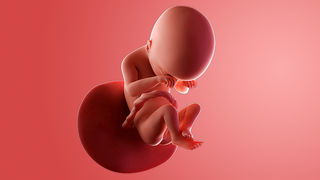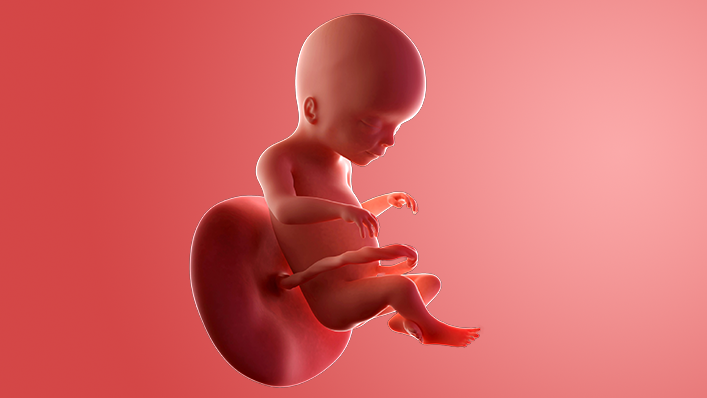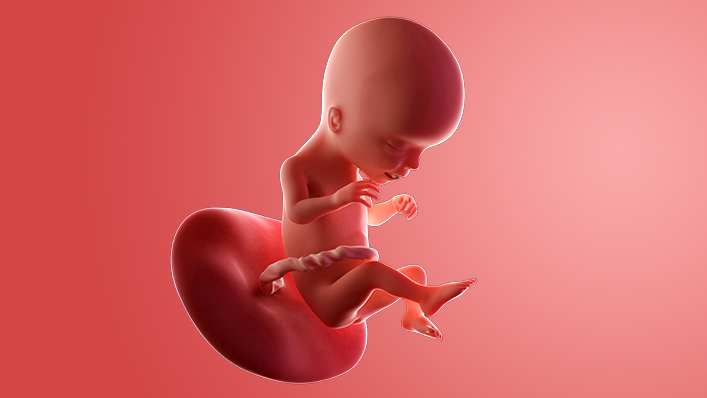What's happening in my body?
You might be starting to feel a bit clumsier as your belly gets bigger. Your breasts may have gone up a size, too, particularly if it's your first pregnancy.
Your blood pressure is probably a bit lower than it was, so do not leap up from the sofa, or it could make you feel dizzy.
Your baby has been moving around for the past couple of months, but you might not have noticed. You may start feeling some movement now though – it feels like a bubbling or fluttering inside your belly.
You may also notice a line down your stomach, called the "linea nigra" (Latin for "black line"). This is normal skin pigmentation and nothing to worry about. It will probably vanish a few months after the birth.
Your anomaly scan
You'll be offered an anomaly scan at around 18 to 20 weeks.
This is a scan that looks at your baby in detail to see if there is anything unusual about their development and appearance. It can pick up a range of conditions, but not all of them.
The scan will not hurt you or your baby, but it may feel a bit uncomfortable as the sonographer may have to apply a bit of pressure on your stomach to get the best possible view.
Read more about why scans are offered and what they involve on the NCT website.
Is it a boy or a girl?
The sonographer may be able to tell you at this scan, but not everyone wants to know, and it's not always the hospital policy to reveal the sex of the baby.
If you do not want to know, tell them before you start of your scan appointment.
Free prescriptions and dental care
Did you know that prescriptions are free during pregnancy? NHS dental treatment is also free.
You just need a Maternity Exemption Certificate or card (MatEx). Ask your midwife, GP or health visitor for the application form FW8.
Your certificate will be valid for up to a year after your baby's due date or date of birth.
2nd trimester pregnancy symptoms (at 18 weeks)
Hopefully you are feeling more energetic and able to manage your pregnancy symptoms now.
If you are struggling with day-to-day life, talk to your midwife or doctor, they are there to support you.
Your signs of pregnancy could include:
- stretch marks (read about stretch marks on week 17's page)
- tiredness and sleeping problems (week 19 has information about feeling tired)
- swollen and bleeding gums (week 13 has information about gum health during pregnancy)
- pains on the side of your belly, caused by your expanding womb (known as "round ligament pains")
- headaches (read about headaches in pregnancy on NHS.uk)
- nosebleeds
- bloating and constipation (read about bloating on week 10's page)
- indigestion and heartburn (week 25 talks about digestive problems)
- sore breasts
- leg cramps
- feeling hot
- dizziness
- swollen hands and feet
- urine infections
- vaginal infections (see week 15 for vaginal health)
- darkened skin on your face or brown patches – this is known as chloasma or the "mask of pregnancy"
- greasier, spotty skin
- thicker and shinier hair
You may also experience symptoms from earlier weeks, such as:
- morning sickness (read about dealing with morning sickness on week 6's page)
- weird pregnancy cravings (read about pregnancy cravings on week 5's page)
- a heightened sense of smell
- mood swings (week 8's page has information on mood swings)
- a white milky pregnancy discharge from your vagina and light spotting (seek medical advice for any bleeding)
What does my baby look like?
Your baby, or foetus, is around 14.2cm long from head to bottom. That's approximately the size of a bell pepper.
Your baby's hearing, feeling, swallowing and sucking reflexes are developing this week.
They will also be doing a lot of wriggling around and moving their arms and legs.

Action stations
More in week-by-week

Week 19
You might think that bubbling feeling in your tummy is wind, but it could be your baby moving. You'll soon be able to recognise their movements.
More in week-by-week guide to pregnancy


